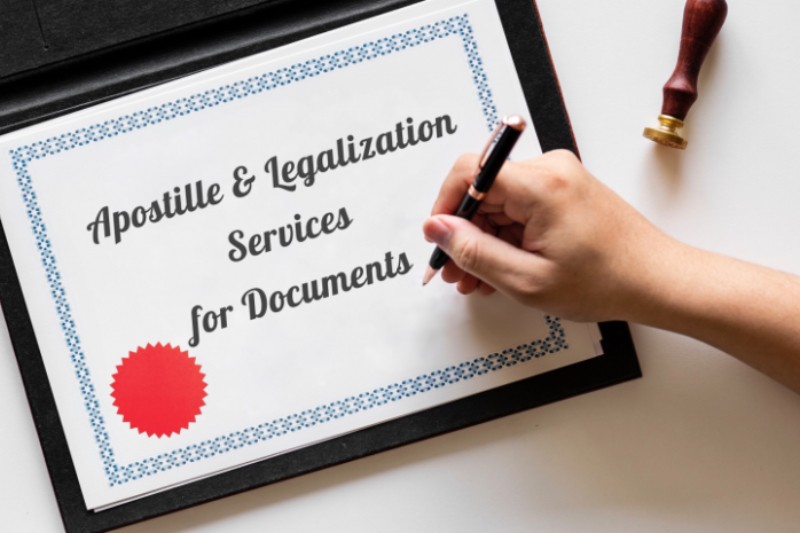Call Us
-
-
-
Dubai, UAE
-
Dubai, UAE

January 2024
In the globalized world we live in, the need for document authentication for international use has become increasingly crucial. Two terms that often pop up in this context are "apostille" and "attestation." While they share a common goal of validating the authenticity of documents, they are distinct processes with unique characteristics. In this comprehensive guide, we'll delve into the intricate details of apostille and attestation to shed light on their differences and help you navigate the complex world of document legalization.
1. International Recognition:
The term "apostille" is often associated with the Hague Convention, an international treaty that simplifies the process of document authentication for participating countries. An apostille is a certificate issued to verify the authenticity of a document, making it readily acceptable in Hague Convention member countries.
2. Single-Step Process:
One of the significant advantages of apostille is its streamlined, single-step process. Documents destined for use in Hague Convention countries can undergo a straightforward certification procedure, making the overall process more efficient and less cumbersome.
3. Standard Format:
Apostilles adhere to a standardized format, recognized by all Hague Convention member states. This uniformity ensures that the document's authenticity is easily understood and accepted across borders, contributing to a smoother international exchange of information.
4. Adequate for Hague Convention Countries:
Apostilles are particularly well-suited for documents intended for use in countries that are signatories to the Hague Convention. For individuals and businesses engaging with nations like the United States, the United Kingdom, or Australia, apostille is often the preferred route for document authentication.
5. Time-Efficient:
Time is of the essence, especially when dealing with international transactions. Apostille processes are generally faster compared to traditional attestation methods, offering a time-efficient solution for those in need of swift document verification.
1. Global Acceptance:
Attestation, in contrast to apostille, is a more versatile process accepted globally, including countries that are not part of the Hague Convention. It is a broader method of document authentication that caters to a wide array of international needs.
2. Multistep Process:
Unlike the simplicity of apostille, attestation involves a multi-step process. Typically, it starts with notarization, followed by verification by government authorities, and, in some cases, embassy legalization. This comprehensive approach ensures a thorough validation of the document's authenticity.
3. Versatility:
Attestation is not confined to a specific set of documents or countries. It is applicable to a broader range of documents, including educational certificates, commercial documents, and personal documents. This versatility makes attestation the preferred choice for individuals and businesses engaging with countries outside the Hague Convention.
4. Country-Specific Requirements:
Each country has its own set of rules and regulations when it comes to document authentication. Attestation caters to these specific requirements, ensuring that the document is endorsed in a manner that aligns with the destination country's legal framework.
5. Comprehensive Authentication:
The attestation process provides a more comprehensive level of authentication, making it suitable for documents that require a higher level of scrutiny. This can be particularly important for legal documents, business agreements, and other critical paperwork.
1. Destination Country:
The primary factor influencing the choice between apostille and attestation is the destination country. If the document is intended for use in a Hague Convention member state, apostille is often the more straightforward option. For countries outside the convention, attestation becomes the go-to method.
2. Document Type:
Consider the nature of the document. Apostille is generally preferred for personal documents such as birth certificates, marriage certificates, and educational transcripts when dealing with Hague Convention countries. Attestation, on the other hand, is versatile enough to handle a broader range of documents, including commercial and legal papers.
3. Complexity and Time Constraints:
If time is of the essence and the document is destined for a Hague Convention country, apostille's streamlined process is likely the better choice. However, if dealing with a non-convention country or if the document requires a more intricate authentication process, attestation may be the more suitable option.
4. Legal Requirements:
Familiarize yourself with the legal requirements of the destination country. Some countries may specifically mandate apostille, while others may have a preference for attestation. Adhering to these requirements ensures that the document is recognized and accepted without any hiccups.
5. Professional Assistance:
Given the intricacies of document authentication, seeking professional assistance is often advisable. Legal experts or agencies specializing in international document services can guide you through the process, ensuring that all requirements are met and the document is properly authenticated.
Choosing the Right Path for Document Authentication
In the vast landscape of international transactions, apostille and attestation serve as the gatekeepers, validating the authenticity of documents crossing borders. Understanding the nuances of each process is crucial for individuals, businesses, and institutions engaged in global activities.
Whether opting for the simplicity of apostille or the versatility of attestation, the key lies in aligning the choice with the destination country's requirements and the nature of the document. As the world continues to shrink, and cross-border interactions become the norm, navigating the complexities of document authentication becomes an essential skill for anyone venturing into the global arena.
So, the next time you find yourself in need of authenticating a document for international use, consider the best attestation services in Dubai for all document apostille and attestation from all Embassy and Countries